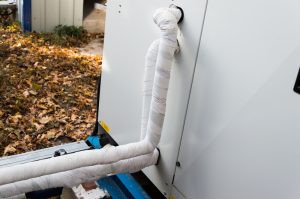 Your home’s air conditioning system is a complicated piece of machinery. The majority of homeowners may get the basics of how an air conditioner works, but not all the intricacies involved. Therefore, you may not understand how each of the components work together, and what is “right” and “wrong” with what an inexperienced handyman might tell you about your cooling system.
Your home’s air conditioning system is a complicated piece of machinery. The majority of homeowners may get the basics of how an air conditioner works, but not all the intricacies involved. Therefore, you may not understand how each of the components work together, and what is “right” and “wrong” with what an inexperienced handyman might tell you about your cooling system.
For instance, have you ever been told that the refrigerant in your central air conditioner system needs to be recharged (refilled) each time you have a maintenance appointment? This is, unfortunately, a dangerous misconception. Because, if you’re losing refrigerant from your system, it actually means you have a leak. Keep reading to learn more!
Debunking the Refrigerant Myth
As we alluded to above, some homeowners mistakenly believe that the refrigerant in their air conditioning system can “run out.” Our techs will sometimes get calls in the summer from homeowners asking to have their refrigerant “topped off” or refilled—but there is a problem with that.
Truly understanding how your air conditioner works can save you a headache in the form of a malfunctioning system and premature AC replacement later on down the line.
Your air conditioner does not deplete refrigerant levels as it cools your home. Homeowners often misunderstand refrigerant, thinking it’s a sort of fuel source for the AC unit. Your refrigerant doesn’t supply any energy to your air conditioner. Rather, electricity powers your system, and the refrigerant is continuously recycled in order to pull heat from your home and provide cooled air.
As we said, if your refrigerant levels have lowered then it means your AC system has a leak.
What Can Be Done?
So, what if you do have a refrigerant leak? One of the most common signs of this occurrence is the sound of hissing or bubbling coming from your system. Another sign is decreased cooling output from your air conditioner. If you suspect you do have a refrigerant leak, you’ll need a trained and licensed professional to deal with the issue by sealing the leak’s location and then recharging the refrigerant level.
Alternatively, you can continue to run your air conditioner on low levels of refrigerant, and put your cooling system at risk. Your air conditioner will lose too much cooling power, and the compressor will suffer damage as it tries to function without the assistance of refrigerant. Running your system in this matter is an easy way to damage it.
Other Causes of Low Cooling Output
All that said, a refrigerant leak is not the only reason you might feel a low cooling output from your air conditioner. While this is definitely a symptom, it’s also a potential system of:
- A Miscalibrated Thermostat: Check your thermostat. First off, is it correctly set to “cooling” mode, and to the right desired temperature? Is everything displaying okay on the screen, in the case of a digital thermostat? Be sure it’s properly set, and if you’re still having problems then you may very well have a refrigerant leak.
- A Clogged Air Filter: Here’s another debunked myth for you—the air filter that comes standard with your HVAC systems is not actually there to protect your indoor air quality, but rather the interior components of your HVAC systems from dirt, dust, and debris which can all restrict airflow. When airflow is restricted, it can certainly feel like not enough cool air is reaching you. Fortunately, changing out the air filter is something you can (and should) do on your own, every 1-3 months or any time you find it’s limiting airflow.
When you need professional AC repair in Fairfax, VA, look no further than AllTech Services, Inc. Contact us today!

